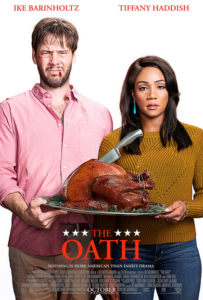Film Review: The Oath

The fictionalized America of Ike Barinholtz’s film The Oath could have been characterized as dystopian if it had premiered two years ago, but in 2018 the setting and story feel as if they could be ripped from the front pages of the New York Times.
The film opens as the president of the United States issues a national loyalty oath, asking citizens to swear allegiance to their president and their country by the day after Thanksgiving, otherwise known as “Black Friday.” What some see as a benign and patriotic request akin to the pledge of allegiance, others view as a dictate paving the way for fascist persecution of political opponents. In the wake of the oath, protests and counterprotests ensue, erupting into violence as police and demonstrators clash and regular citizens battle out their ideological differences in bouts of hate-fueled road rage and restaurant disputes. The uncomfortable plausibility of the film’s premise is thankfully punctuated with some outrageous and dark comedy—affirming that, when it comes to contemporary political discourse, if you don’t laugh you’ll cry.
Director Ike Barinholtz stars as Chris, a progressive political news junky who is vehemently opposed to the loyalty oath and airs his concerns about oppressive government overreach to all who will listen—but mostly just to his wife, Kai, played marvelously by Tiffany Haddish. As Thanksgiving approaches, Chris and Kai gear up to host Chris’s conservative, oath-supporting family members for the holiday. Although Chris is warned time and time again not to bring up politics while his relatives are visiting, he simply cannot help himself. News reports ping his phone that opponents of the oath are disappearing, and government agents are likely to blame. When Chris’s brother arrives, accompanied by his girlfriend Abby (who might as well be named Tomi Lahren), Chris abandons all efforts to hold his tongue. With self-righteous indignation, Chris makes it his personal mission to swat down their half-baked, Alex Jones-inspired talking points. The family dinner plays out like a poorly moderated comment section under a Trump news story. Everybody is yelling in all-caps, and everybody is (mostly) wrong.
Although The Oath nails the absurdity of the way people currently talk about politics, it presents no real solution. The message of the film seems to be that politics doesn’t matter as long as you have family. But the “politics” of the film have little to do with politics and everything to do with fundamental human rights.
If someone says, “I don’t think people should be killed in the streets for the color of their skin or detained (and disappeared) without due process,” and the response is “I don’t think we should discuss politics at the dinner table,” then that person doesn’t have a problem with politics; they have a problem with basic humanity. Refusing to engage in healthy political discourse is not civility; it is privilege in its purest form and only perpetuates injustice. Obviously that doesn’t mean you should shout down and heave insults at anyone who disagrees with you (as seems to be Chris’s primary tactic in the film). Rather, healthy discourse involves listening, finding common ground, and working toward mutual understandings and solutions—without sacrificing your values.
Chris has a lot to learn about arguing productively, and as he lashes out at his conservative family members, Kai mediates and begs for civility, often invoking the need to protect their young daughter. In one tense scene, as she argues with her husband in their driveway, she states emphatically that she doesn’t care about the oath or the turmoil in the world; all she cares about is raising and protecting their daughter. Those of us privileged enough to be insulated from societal injustice have a responsibility to take a stand against it, and Kai is selfishly shirking that responsibility. Acquiescing to injustice in order to protect your family only makes it harder for others to resist, especially when you stand by while those resisting are persecuted. That being said, berating your family members probably won’t help either.
Just as tensions seem to reach their breaking point, two government agents crash the party in response to an unverified report that Chris was interfering with other’s First Amendment right to sign the loyalty oath. The situation rapidly spirals out of control. While the first half of the movie plays out like a witty, albeit un-nuanced commentary on a hyper-partisan America, the second half is an anxiety-inducing comedic thriller that will leave you in captivated despair. Still, Barinholtz trades some potentially teachable moments for an approach more palatable to audiences from all sides of the political spectrum. At the very least, The Oath’s depiction of a worst-case scenario Thanksgiving should serve as some preemptive therapy to assuage the apprehension of dealing with ideologically opposed family members over the upcoming holidays.
